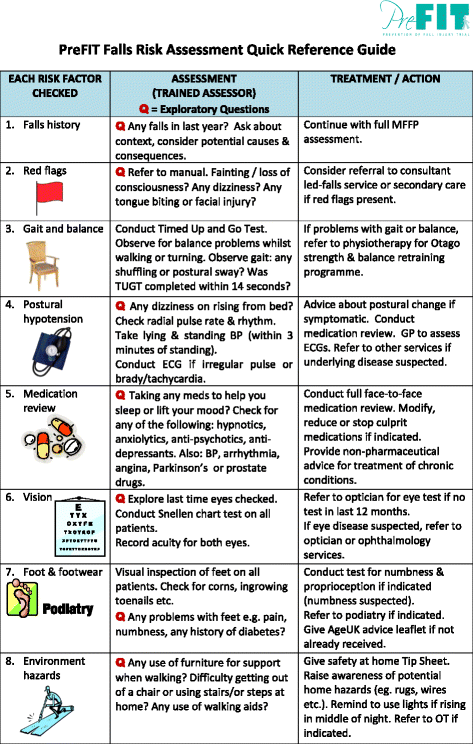Not known Details About Dementia Fall Risk
Not known Details About Dementia Fall Risk
Blog Article
What Does Dementia Fall Risk Mean?
Table of ContentsAll About Dementia Fall RiskOur Dementia Fall Risk PDFs10 Easy Facts About Dementia Fall Risk Shown3 Simple Techniques For Dementia Fall RiskWhat Does Dementia Fall Risk Do?
The FRAT has three sections: drop risk status, risk variable checklist, and activity plan. A Loss Threat Status consists of data regarding history of recent drops, drugs, mental and cognitive status of the person - Dementia Fall Risk.If the person ratings on a danger aspect, the equivalent number of points are counted to the person's fall risk score in the box to the far. If a person's autumn risk rating amounts to 5 or greater, the individual is at high threat for falls. If the person ratings just four factors or reduced, they are still at some danger of dropping, and the nurse ought to utilize their finest clinical evaluation to manage all fall danger aspects as component of a holistic care strategy.
These basic techniques, generally, help establish a risk-free environment that decreases unintended drops and defines core safety nets for all people. Signs are essential for clients in danger for drops. Health care suppliers need to recognize who has the condition, for they are responsible for carrying out activities to promote patient safety and protect against drops.
Unknown Facts About Dementia Fall Risk
Wristbands need to include the patient's last and initial name, day of birth, and NHS number in the UK. Only red color must be utilized to indicate unique patient status.
Things that are also much may require the individual to reach out or ambulate unnecessarily and can potentially be a threat or add to falls. Assists avoid the client from heading out of bed without any aid. Nurses react to fallers' phone call lights much more rapidly than they do to lights launched by non-fallers.
Aesthetic impairment can significantly trigger drops. Hip pads, when used effectively, might decrease a hip crack when loss happens. Maintaining the beds closer to the floor minimizes the threat of drops and major injury. Putting the bed mattress on the flooring dramatically reduces loss risk in some medical care settings. Low beds are designed to minimize the range a client falls after moving out of bed.
What Does Dementia Fall Risk Mean?
Clients that are high and with weak leg muscles that attempt to remain on the bed from a standing setting are likely to fall onto the bed because it's too reduced for them to reduce themselves safely. If a high individual attempts to get up from a reduced bed without help, the patient is likely to drop back down onto the bed or miss out on the bed Look At This and drop onto the floor.
They're developed to advertise prompt rescue, not to avoid falls from bed. Aside from bed alarms, boosted guidance for risky people additionally her explanation might aid prevent falls.

People with an evasion gait increase fall opportunities dramatically. To reduce loss danger, shoes need to be with a little to no heel, thin soles with slip-resistant walk, and support the ankles. Recommend person to use nonskid socks to avoid the feet from moving upon standing. Motivate clients to wear suitable, well-fitting shoesnot nonskid socks for ambulation.
The 7-Minute Rule for Dementia Fall Risk
In a study, homes with ample lights record less falls (Ramulu et al., 2021). Renovation in illumination at home might minimize loss prices in older adults.

Sitters work for guaranteeing a secure, secured, and risk-free environment. Studies showed very low-certainty proof that caretakers reduce fall danger in severe treatment healthcare facilities and just moderate-certainty that alternatives like video tracking can decrease sitter use without raising loss threat, recommending that caretakers are not as valuable as initially thought have a peek here (Greely et al., 2020).
How Dementia Fall Risk can Save You Time, Stress, and Money.

Increased physical fitness minimizes the threat for falls and restricts injury that is sustained when autumn transpires. Land and water-based exercise programs may be likewise helpful on equilibrium and gait and therefore reduce the threat for falls. Water exercise may contribute a favorable advantage on balance and stride for ladies 65 years and older.
Chair Increase Workout is a straightforward sit-to-stand workout that assists strengthen the muscular tissues in the upper legs and buttocks and improves movement and freedom. The goal is to do Chair Rise workouts without utilizing hands as the customer comes to be more powerful. See resources section for a thorough guideline on exactly how to execute Chair Rise exercise.
Report this page